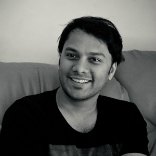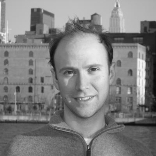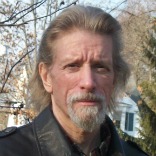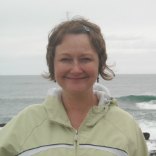Tweetsie Railroad
Gregory Wolos
There’s a stranger at the front door when I finally get there. Katherine always tends to the doorbell, and I forgot she isn’t home. She’s been visiting our son, from whom I’m estranged, for so many days I’ve lost count. Katherine used to be estranged from Jarrod too, until she finally wrote him a letter and he wrote back. Now she’s with him and his family. She’s missed the Olympics. Gymnastics is her favorite event, and I’ve recorded it. Maybe she watched in Colorado—I don’t know, because we haven’t spoken. She knows I don’t like talking on the phone. The little USA gymnasts are all I watch now. They flutter like disciplined canaries. I sit with my face so close to the screen that my eyebrow hairs lift from the static electricity. I’ve memorized every routine. It’s good to know when a little girl’s going to land on her behind after a vault or waver on the balance beam or drop from the uneven bars like she’s been shot. If you know what’s coming most of the shock is gone, and it becomes clear that falling is part of the big pattern of the world: gravity always wins.
At first I mistake the stranger at the door for one of the USA gymnastics coaches—if you watch something long enough, it becomes the way you see things. The guy has a big belly like the coach, and his white T-shirt matches the jacket the coaches wear. Some of his important teeth are missing. He’s holding a scythe as if it’s a flag.
“I’m Willy,” he says. He lets the handle of the scythe slip through his hands to the porch and leans on it, waiting, confident that his name explains everything. I wait, too. I’m generally disinclined to speak until I understand a situation. Even strong silent types like Willy crack before I do. He looks about my age, which means he probably started collecting Social Security a decade ago. Wisps of grey hair rise like dead grass from his comb-over. His eyes are as cold as bullets.
“I’m here to whack your weeds,” he says. “I talked to your wife. I’m from Umbrella. She said the weeds down at the river block your view. Cattails, she said.”
I nod. Umbrella is an organization that sends retired guys to do odd jobs for the elderly and handicapped. They charge a fraction of what a regular handyman would cost. Katherine learned about them from our neighbor Joan Pritchard. My wife forgot to tell me she hired someone to lop the cattails. If it were up to me, I’d let the weeds take over. I’m so nearsighted these days that if I didn’t know there was a river a hundred yards behind the house, I’d assume the occasional sparkle I catch was a symptom of further eye trouble. But Katherine cherishes the view. “Why live by a river if you can’t see it?” she asks.
“Well, come on in, then,” is the first thing I say to Willy. “The cattails are out back.” I confuse him, inviting him inside when the job he’s hired for is down at the river, and he hesitates. He doesn’t know what to do with his scythe. “Bring in your weapon, sir,” I say. “The quickest way to the water is straight through the house and down the deck steps. It saves at least ten yards of walking.” I hobble off, and my poor mobility makes my point that distance is relative—ten yards is a big deal for me. “Follow me,” I wave, on my way to the back door. “But be careful. The wife’d have my head if she knew I let you drag a tool through the living room.” Willy’s got the perfect instrument for head-having, I think as I clump along—or head-halving. I try to twinkle an eye at the handyman to see if he appreciates my pun, but of course he can’t read my thoughts.
He’s stopped in front of the TV, which I’d put on pause when the doorbell rang. One of the tiny gymnasts is frozen upside down in mid-flip above the vaulting box. Willy’s scratching the rusty growth on his jowls.
“How the hell’s she do that?” he asks. He seems to think she’s pinned in place like a butterfly.
“The TV’s on pause,” I explain. “She’s about to fly through the air, flip and spin, and stick the landing.”
“Yeah,” Willy nods. He doesn’t move. He probably wants me to release the pause so he can see the flying and sticking, but I continue back through the house.
“This way,” I summon. “See the river back there?” We’ve got bay windows for the view on this level and upstairs in the bedroom where I don’t sleep anymore because it’s too hard for me to walk up. I sleep in my son’s old room. “I can’t see distances so well anymore, but you probably can.”
“Yeah,” Willy says. I hear the knock of the scythe he’s using like a walking stick on our wood floors as he follows me, and I hope he’s not leaving marks I’ll have to explain to Katherine. “Cattails’ll take over, if you let them.”
Then I sense he’s stopped again, and when I turn, he’s between the dining room and living room. His head’s swiveling back and forth: he’s noticing the candles on display all over. The truth is, I probably led him through the house so he could see them. “You sure got a lot of candles,” he says.
“Yes sir, we do,” I say. There are candles everywhere, on top of everything. Not tapered dinner or church-altar candles—ours are artsy, decorative, wrist-thick. We never light them. If I try to picture a candle flame, all I see are the birthday cakes Katherine used to bake for Jarrod and his younger sister Linda. Our daughter died a few years ago of cancer. She was trying to have a baby and couldn’t get pregnant, and then the doctors found the cancer and she was dead before a year was up. I thought we’d keep in touch with Todd, my son-in-law, but he’s out West now, where his folks live. Katherine says he’s been remarried. I remember putting my arm on Todd’s shoulder at the funeral, and, just as he was going to hug me, he saw Jarrod and wound up hugging him instead. For the sake of decorum, Jarrod stood beside his mother and me through the service, but he and I never exchanged a word. When I add up the years since we last talked, I start from well before my daughter’s funeral.
Willy’s stopped dead in his tracks. He scratches his chin while he takes in all the candles, maybe wondering if the folks he’s cutting weeds for belong to some kind of cult. Maybe he thinks we’re deep in mourning for something, because his hand moves up to his head as if to remove a hat.
“We used to make candles,” I explain. “Kind of a home business, after I lost my job. We’re talking more than twenty years ago. We sold them at craft shows and at gift shops. We tried mail order, but that didn’t work out.”
“Did you try the internet?” Willy’s got his eye on a pair of candles set on the cupboard. They’re taller than the others, fourteen inches. I fixed up a special milk carton mold to make them. These were made with chunks of blue wax of different shades set in white. I think of them as “the twin towers,” because they remind me of the World Trade Center. We were done making candles a decade before the towers fell—I got a regular job as a school bus driver that included health insurance. I’d never light my twin tower candles—what might people think if they saw them half-melted? But I know I’m the only one who sees their tragic potential.
“We stopped the business before the internet became a thing,” I say.
Willy’s gaze beams like a searchlight: candles on the mantle; candles on bookcases; candles on the kitchen counters and on the refrigerator; candles on every window sill and table. There are even candles on top of the TV. All colors. Any shape that could be carved out of a milk carton or coffee can mold. There are stacks of flat little Christmas and Halloween floating candles made to look like snowflakes or Jack-o-Lanterns. There are so many candles that if I were a guest in my own house, I probably wouldn’t see anything else.
“Years ago there was a real candle boom,” I tell Willy. “It lasted about half a dozen years. For a while, we maintained a genuine cottage industry—the whole family was involved. Katherine and I were fulltime candle makers, and my daughter helped after school and on weekends. My boy did his share when he came back from college.” I’m not about to go into the full story about how things fared with Jarrod. Instead, I picture the big truck from Mobil Oil backing down our driveway, delivering the cases of raw paraffin I stacked in the garage. I remember the big pots of boiling wax on the kitchen range, stacks of milk-carton molds, and snack tray sheets of red and blue and green and orange and yellow wax we’d slice into chunks with Exacto blades. I could show Willy scars on my wrists and hands from spilled wax.
Bottles of coloring powder were lined up next to the range. And the smell of strawberries saturated everything—it was easiest to keep to one scent. Before long, all our meals tasted like strawberries— Katherine prepared our dinners next to bubbling pots of wax. Linda cried when she couldn’t wash the smell of strawberries from her hair. She said the sight of strawberries made her gag. She stopped inviting friends to the house.
“You said ‘Katherine’?” Willy’s head is cocked.
“My wife, Katherine,” I say. “She called you about the cattails, remember? I can pay you in candles if you want. You can keep them or give them as gifts. The scent’s worn off after all these years. I’ll let you in on a trick of the trade—I used to wipe all the candles down with some extra scent before I took them into the gift shops.” My “false-scenting” was one of the “artistic differences” Jarrod and I had before our estrangement.
Willy’s shaking his head, about being paid in candles, I think at first, and I wouldn’t blame him. But he digs in his pants pocket and pulls out a scrap of paper. “‘Joan,’” he reads, and winces. “Somebody named Joan called me, not Katherine. Joan Pritchard.”
“That’s my neighbor,” I say. “Joan Pritchard lives next door.”
“This is 246 Riverside?”
“This is 24-8 Riverside.” Willy and I are figuring out at the same time that he’s at the wrong house, which explains why I didn’t remember he was coming. “I guess Joan’s got cattail problems, too. I can’t really see down there, like I said. But since you’re here, ours definitely need to be cut.” Katherine will appreciate my having her view cleared. I tell a lie: “I happen to know that Joan Pritchard isn’t home today. She left for Cape Cod. She’ll be gone a week. There’s a surprise family reunion. I’m supposed to feed her cat until Monday. She must have forgotten that she hired you.”
Willy rasps his slip of paper across his chin. He squints like he’s about to say something when all of a sudden there are cheers and an excited male voice: the TV’s gone off pause, and the little gymnast has finished her vault. I know that she’s stuck the landing, but Willy’s staring toward the TV like it’s haunted. There are five big candles on top of it. Each one is composed of different colors, but it’s hard to tell. “Candle colors fade,” I say. “I should dust them and polish them. Do our cattails, okay? I’ve got cash.”
~
On the screen is a little Russian girl in a white leotard. In a second her music will start, and, at the end of her first tumbling run, she’ll land out of bounds. She’ll hit the mat awkwardly and stagger. Points deducted. Eventually, she’ll shrug off her coach’s hug with a pout. There will be tears in the dark Russian eyes she’s surrounded with sparkles. I pause on the close up of her face. When my kids were little, before the candles, I worked as a purchasing manager at an aluminum products plant. We took regular family vacations. One summer we drove down to the Smokey Mountains to see the sights. We stopped at a tourist trap called Tweetsie Railroad. It featured an old, working small gauge locomotive. The highway billboards advertised “Rides, Souvenirs, Snacks, and More!” Jarrod would have been eight, Linda four. Admission exceeded our budget, so Katherine and I concluded in “parent talk” that I would take Jarrod in without his sister. What would a little girl care about trains, anyway?
We boys left the girls in the parking lot. We paid our admission and rode the undersized train around a couple of miles of mountain track, while the old-time engineer tooted the whistle and the old-time conductor made a big deal of punching everyone’s over-sized ticket, then told us the locomotive’s history. Afterwards, Jarrod got the free cotton candy his admission entitled him to, and we went to the souvenir shop, where his job was to pick out an inexpensive souvenir for his sister. He chose a yellow plastic whistle shaped like the dwarf locomotive.
When we met them back at the car, Katherine told us they’d counted license plates from sixteen states as they passed through the parking lot to the “Free Scenic Overlook.” She said she saw deer in the valley below, but Linda shook her head no when I asked if she’d seen them, too. Jarrod shrugged that they hadn’t missed much, and he gave his sister the cotton candy and the yellow Tweetsie Railroad whistle. She accepted both, looking at me, not her brother. Her eyes were big and moist; they didn’t have sparkles around them, but otherwise they looked just like the little Russian gymnast’s.
Linda blew the locomotive whistle’s single piercing note the whole time we drove through the mountains looking for a cheap motel. It set my teeth on edge, but I didn’t tell her to stop. When I think of my daughter, I smell strawberries and hear that whistle.
~
Right now Willy must be swinging his scythe, toppling the cattails. I watched him melt into the fuzzy landscape on his way to the river. He plans to clear our weeds and Joan’s. He’ll collect from our neighbor another day because of my lie about Cape Cod. She may see him working, but she’s got a bad hip, so I doubt she’ll walk down to the river; if she phones, I won’t pick up. The cattails are a big job for a man Willy’s age, especially when he has to lug around that belly. The sun can get pretty strong, and he wasn’t wearing a hat.
A commercial break in the gymnastics coverage features a duck quacking about insurance, and I remember the geese and the decoy dogs that I should have mentioned to Willy. A few springs ago Katherine and I woke up to find a flock of Canadian geese settled in our yard. We held hands as we walked toward them; they honked and flapped a little and flowed like lava to the river. They left their crap behind: hard little turds like cigar butts. They took up residence for the summer, flew off for the winter, and came back the following spring. So I bought a set of decoy dogs—three for ninety-nine dollars. The dogs are black cut-outs that look like the shadows of coyotes. We staked them out by the river bank, and they’re still out there. We’ve been goose free for a while. I can’t really see the dogs anymore. Last time my eyes were strong enough, I could only make out one—I suspect the other two have fallen over.
I wonder if Willy likes the dogs. Katherine hates them. She’ll frown at them through the breakfast room window and complain, “Those things look like dog-shaped holes cut out of the living world. They’re more not-there then there.”
“They do keep the geese away,” I’ll reply. It was looking at the decoy dogs that made Katherine blame the candle-making for Linda’s cancer. A friend of hers had a Siberian husky that died of some kind of blood disease. The vet said there might have been something poisonous in the dog’s environment.
“All that wax and scent—we breathed it and ate it for years,” Katherine said one morning. She hadn’t touched her eggs. Her face crimped with her new idea. I suspect she was looking at one of the black dogs while she ruminated. “I bet there was something deadly in the wax. I’m going to look it up.” If she did, she’s never told me, but not long after getting the poisoning idea she decided to write to Jarrod.
“Is there anything you want me to tell him?” she asked. I’d only seen him once in fifteen years— at Linda’s funeral where we didn’t speak.
“Tell him not to bother coming to my funeral,” I said. “If he does, I’ll follow him to his house and haunt him.” It was a dark thing to say. Before I’d invited him into the candle business, Jarrod had tried college for a year, flunked out, and come home with his tail between his legs and an attitude to cover up his failure. We hoped candle-making would rescue him like it had me.
Jarrod had been excited at first. He had some grand marketing schemes. Before long, he said, we’d get the operation out of the house and into a factory. Back into the real world. Unfortunately, he wound up contributing very little to the business. His sister put in more hours making candles, even though she was still in high school. Jarrod dedicated himself to the “artistic” end of things. He claimed to have an eye for patterns and colors, and some days he’d rise at noon and work until midnight carving one of what he called his “specialty” candles. He wanted to sell his masterpieces for a hundred dollars! I challenged him to tell his price to the gift shop owners who were my customers, but he demurred. “I’m an artist,” he insisted, “not a broker.” He denied smoking pot in his bedroom, claiming he burned incense “to cover up the god-damned strawberries!”
Jarrod left home after our last big fight. Shortly thereafter I got the school bus driving job. Katherine and Linda and I kept up with the candle-making for a while, but, because it had always been work, I couldn’t get it to feel like a hobby, and the pots and molds and extra wax went into the basement. We never got around to selling off our inventory of candles. Eventually, they were all on display.
~
There’s a little gymnast wavering on the balance beam, but above her, on top of the television, are five candles. Jarrod worked on the set, “The Elements,” for a month and insisted they be marketed together. I was too embarrassed by the price tag to take them on the rounds of the gift shops. The first is “Earth Tones.” It’s brown and green swirled together. Jarrod carved, dipped, and re-dipped for a week, fiddling away without sleep until he was satisfied. Like the other four candles, “Earth Tones” is fused onto the TV. I’d have to pry them off. Next to “Earth Tones” is “Fire”—yellows and oranges and reds spin together and rise to the wick. Then “Ocean”: blues fade the most over time, I’ve noticed—like with my “twin towers.” “Ocean” reminds me of the last time I looked hard at my own eyes in the mirror. Jarrod admitted that “Air,” the fourth candle, was a failure. It looks like a glass full of ice cubes. The fifth candle doesn’t have a name. It’s black and carved with deep grooves. It resembles one of those dark-wooded African statues. I don’t know who Jarrod expected to buy a black candle. I make a mental note to ask Willy what he thinks, but he probably won’t pass through the house when he’s finished with the cattails. I don’t know why I make mental notes. Whenever I try to recall one, the whole batch swirls around my head like a blizzard.
Although I’ve made a point of not asking Katherine about her communication with our son, things leak; I know he’s an art teacher. He’s married and has children, my grandchildren. I think of grandchildren while I watch the gymnasts soar like little angels on the screen under “The Elements,” but I prohibit myself from imagining that they’re Jarrod’s children. Instead, I give these kids to Linda: I pretend they’re the spirits of the babies she never had. They’re stuck in limbo—inside my TV. Each of them has a whole lifetime of energy bottled up just for the routines I make them repeat.
~
The telephone wakes me up from the dream I’m having about the hurricane that once made it all the way up the coast. It had been downgraded to a tropical storm by the time it drenched us. The river rose over its banks, swelling into a lake. The water crept closer and closer to the house until it stopped no more than fifteen feet away. Some neighboring houses flooded. Ducks were swimming among the tops of our rose bushes—this was years before there were any geese. Katherine was pregnant with Linda, and Jarrod was a pre-schooler. He sat on my lap while we watched the water. It rose over the ladder rungs of the slide on his swing set. The metal seat of the swing went under—the chains it hung from strained against an invisible current. The situation might have been frightening to a child, so I tried to get Jarrod to laugh by making quacking noises and pinching at his butt.
When the phone rings, I still feel my boy’s weight on my thighs, and I wonder who’s calling. It’s dusk. The TV recording of the gymnasts has played through. I can “Save,” “Delete,” or “Start Over.” I’m always worried I’ll accidentally press “Delete.” The phone keeps ringing as I paw around my legs for the remote control. I’m not going to get up to answer. Katherine’s the phone-answerer. I listen to messages, if they’re left. I would pick up if I thought my wife was making the call, but why would she do that when she knows my habits? For a moment I think maybe she’s convinced Jarrod to call, but that’s just the after-effect of touching him in my dream.
Who had I been worried might call? My mental notes whirl, all of them blank pages. Joan Pritchard—why am I thinking it’s her? Oh—the thought startles me—it’s because of Willy and my story about her being on Cape Cod. Maybe she’s seen him. Maybe he’s stopped off at her house. Maybe they’ve discussed my lie. I’m not going to pick up for Joan Pritchard. The phone stops ringing.
But where is Willy? The day is done, and he hasn’t come for his pay. All five candles on the TV appear black in the gloaming, even “Fire.” Had Willy seen me asleep? He might have walked through the back door and passed right by me, scythe and all. If it weren’t so dark I’d check for muddy footprints. On TV the gymnasts are still hidden behind the options I woke up to: “Save,” “Delete,” “Start Over.”
I feel a pang of concern. Maybe Willy’s trying to reach me by cellphone from the river’s edge. Maybe there’s an emergency. It could be nothing— maybe he’s found the fallen decoy dogs and wants to know if he should prop them back up. I try to distract myself with other thoughts: what would these rooms look like if I lit all the candles? It’s gotten very dark in here—how bright would a hundred candles make it? From the outside, the windows would be ablaze! Willy might think I was signaling him. But lighting a hundred candles would take all night, and I don’t know where Katherine keeps the matches.
~
I head down to the river to find Willy. The darkness is nearly total. If my house was ablaze behind me, the night would be my shadow swallowing everything in the world. Soft grass tugs at my slippers—I keep stepping out of them and shuffle my feet back in. The ground is cool and damp. I spread my arms as if I’m crossing a balance beam through the blackness.
The swing set is the first thing I don’t see, because it’s not there anymore. It was disassembled and carted off twenty years ago. I’m on the spot where ducks swam once, where rosebushes used to be. Our crabapple trees materialize one by one until I’ve counted all six. Beyond them will be a stretch of clear ground where the kids played kickball and soccer and ran down Frisbees. Crickets— when I notice their thrum, I automatically look up for stars, but there aren’t any.
Now I walk with one hand outstretched like the Mummy from old horror films. The Mummy limped so slowly toward his victims it seemed ridiculous that they didn’t just run away. A stand of tall oak trees rises with a different kind of darkness from a low spot where water collects every spring. We used to call the puddle “Linda Lagoon.” I cross paving stones I’d set down long ago. They’re slick with moss, and I’m nervous about slipping. I look back at the house, but it’s not illuminated, and there’s nothing to see. If Willy cries for help, will I hear him over the crickets? I’m trying to remember the sound of his voice. What did he say besides “Yeah”?
I’ve reached the oldest trees. Their huge, rotted branches sometimes fall during windstorms. Katherine would never let the children play under them. This is where the geese gathered. I feel through my slippers for their turds as if they’re landmines. I imagine stumbling through settled bodies, the burst of flapping and honking, their beaks striking from their snaking necks. The cattails and river are just ahead. I staked the decoy dogs at this verge, where the trespassing geese would see them.
~
I shiver when I bump into the first dog. I pat it on the head. If I’ve gotten this far, then the river is close. The cool air smells fishy. Ahead is a broad, cricket-less silence. I don’t see the other two dogs.
“Willy—” I call, “Willy, are you down here? Are you okay?” Nothing. My words hang in the air like fog. I imagine I’m calling to myself from a canoe out in the river. I lean on the dog’s head, forgetting it’s just a cut out. It collapses and I go down. I grunt when I hit the ground—it’s soft, but the wind is knocked out of me. I’m on my back. One of my arms is thrown over the dog’s flat body. The other two dogs must lie nearby. Beneath them, the grass is probably dead. There’ll be bugs and worms.
Still on my back, I blink toward where the river must be, but I don’t expect to see it: it reflects a starless sky. And unless Willy finished his job, there’ll be a wall of cattails. I squint until my eyes ache. I should have brought the flashlight. It’s stored—where? I see a white bloat come and go—a goose? Willy?
I try to call him, but I haven’t caught my breath from my fall. One side of my face is wet—I must have rested my cheek in the grass. I pretend the decoy dog has licked me. “Willy,” I whisper. He must be in the water, half-covered by cattails—that’s why he seems to come and go. Had he dropped in mid-swing and sunk slowly in the shallows? His scythe must be nearby. I wonder if he talked to the decoy dog.
I have an urge to pull myself forward. Maybe I will in a while— across the grass into the cattails. Water will soak my arms, my chest, my crotch and thighs, and then I’ll be lying next to Willy. I think of the last time I stretched out my leg in bed and touched Katherine. It seems like a very long time ago. With one ear in the river, I’ll hear it sliding by. I could nudge Willy’s body with my foot, and he might slip peacefully into the current. No one would ever know he’d visited.
If only I’d brought my floating candles—the flat ones shaped like snowflakes, flower petals, and Jack-o-Lanterns. I could light them and set them adrift after Willy. They’d seem like the reflection of moving stars. Maybe the empty sky, for once, would mirror the candle-lit river. Imagine a sky alive with floating constellations! Stargazers might point heavenward, not noticing Willy’s passing body, and ask, “That group of stars up there, what does it remind you of?” And only I would have the answer, surprising the gazers from where I lay in the cattails. “Tiny gymnasts,” I’d say. “It’s their spirits, vaulting through the sky.”





